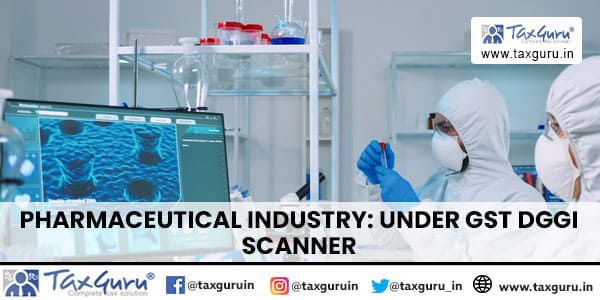DGGI is tasked with conducting targeted investigations. DGGI collects, analyzes, and disseminates intelligence regarding tax evasion and fraud related to GST. This time the targeted investigation is in the pharmaceutical sector.
An article was published in CNBC with headlines – Pharma sector under DGGI Scanner; about ₹450 crore of GST dues recovered in FY24. As per the article, DGGI claims that pharmaceutical companies have evaded GST primarily on account of brand transfer sales, claiming fake ITC on expired drugs, taking fake ITC for business support services, and non-payment of GST under the Reverse Charge Mechanism.
All the above are regular business transactions in the pharma sector. Such transactions are briefly discussed here.
Brand transfer sales
Brand transfer sales in the pharmaceutical industry are strategic transactions that involve the transfer of ownership, manufacturing, and marketing rights of pharmaceutical brands between companies. For instance, Strides has been involved in multiple brand transfers, both acquiring and divesting product lines to optimize its portfolio; Sun Pharma acquired Ranbaxy Laboratories, including its brands and product lines. AstraZeneca’s COVID-19 vaccine was granted as emergency use authorisation in India and AstraZeneca partnered with Serum Institute of India for the supply of the vaccine to the Indian Government and other low and middle-income countries. Such transactions are common in pharmaceutical industries. Where such brands are marketed and or licensed to other companies, then such activities are classified in Schedule II of the GST Act as supply of services.
ITC on expired drugs
With regard to expiry of drugs, the GST Authorities have clarified on the procedures for the return of time-expired drugs or medicines under GST. The circular offers different return procedures based on the GST registration status of the party returning the expired goods.
Registered persons (excluding composition taxpayers) can either treat the return of expired goods as a fresh supply and issue a tax invoice for the same, or, it can be returned through issue of credit note by his supplier.
The recipient (manufacturer or wholesaler) can either claim Input Tax Credit (ITC) on such returns or reduce its output tax liability, subject to ITC and credit notes conditions, as the case may be.
Composition taxpayers should return the goods by issuing a bill of supply and paying tax at the composition rate, with no ITC available for the recipient on the return.
Unregistered persons can return the goods using any commercial document, without charging tax.
Additionally, if the manufacturer destroys the returned expired goods, they must reverse the ITC availed on the return supply, not the ITC used during the initial manufacture of the goods.

ITC for business support services
This has always been a bone of contention between the taxpayers and the Authorities. Business support services generally include promotional schemes and incentives provided to various franchisees, distributors, wholesalers or medical practitioners.The question has been regularly raised before the AAR authorities. In most of the decisions, the AAR has ruled that the ITC shall not be allowed on any promotional or marketing items given to the franchisees, distributors, wholesalers or medical practitioners – as these qualify as gifts and ITC on such gifts are restricted under Section 17(5)(h) of the GST Acts.
However, Karnataka Bench of AAR allowed the ITC on goods procured for distribution to dealers for achieving sales target while observing that the goods so procured and distributed as incentives as per the agreement reached between the company and the recipients are provided only subject to the fulfillment of certain conditions and stipulations. But a gift is something which is given without any conditions and stipulations and hence the same cannot be covered under the scope of gift.
The same issue has been highlighted in the article in the matter of Biocon and Alembic Pharma, where Biocon and Alembic Pharma has voluntarily reversed such ITC.
Government needs to address this inconsistency and offer clarification. It is important to understand that offering incentives to franchisees, distributors, wholesalers or medical practitioners based on fulfillment of certain conditions and stipulations are directly tied to promoting business and improving sales, with the associated costs already factored into the initial supply value. Therefore, where GST has been paid on the original value, ITC should be permitted for procurement of such goods and services or both offered as incentives.
Conclusion
In conclusion, DGGI has raised concerns about the alleged GST evasion practices within the pharmaceutical industry, specifically focusing on transactions like brand transfer sales, claiming fake ITC on expired drugs, and improper claims related to business support services. These issues underscore the complexities and ambiguities present in the GST framework as it applies to regular business operations in the pharmaceutical sector. It is crucial for the Government to address these inconsistencies and provide clear guidance on the application of GST and ITC provisions. Clarifying these matters will not only ensure compliance but also uphold the integrity of the tax system, facilitating fair business practices across the industry.
Reference: https://www.cnbctv18.com/business/pharma-sector-under-dggi-scanner-about-rs-450-crore-of-gst-dues-recovered-in-fy24-19411696.htm





